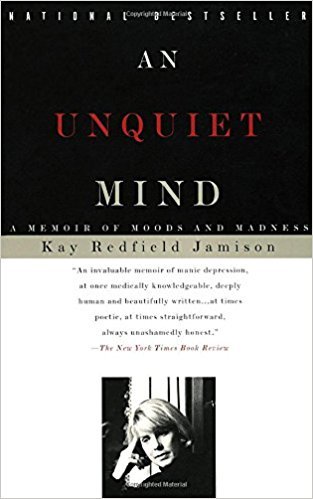Book Review: An Unquiet Mind by Kay Redfield Jamison
As a manic-depressive (bipolar) myself, I can't believe it's taken me almost nine years since my diagnosis to read An Unquiet Mind: A Memoir of Moods and Madness by Kay Redfield Jamison. However, I'm glad that I had a longer-term perspective on my illness upon reading because some of Jamison's most poignant passages simply wouldn't have been so impactful.
The memoir makes it clear that Jamison is highly educated, brilliant, and talented in the field of clinical psychology in addition to being someone whose intense suffering—combined with top-rate writing skills—explores, sometimes poetically, the depths of what it means to be bipolar, such as tolerating a less mercurial and more monotonous, rote existence; integrating a diagnosis into one's identity, including dealing with shame in the aftermath of manic sprees; and even having children, potentially passing on the disorder, of which Jamison wrote:
Oddly enough, it had never occurred to me to not have children simply because I had manic-depressive illness. Even in my blackest depressions, I never regretted having been born. It is true that I wanted to die, but that is peculiarly different from regretting having been born.

amazon.com
I really wish I could get my family members to read this so that they might grasp the sheer magnitude of the existential questions that the manic-depressive faces. The "poles" of bipolar truly push people like me to the outer brinks of the human experience, whether withered up and dead inside or alive with intense light that mistakes itself for an upgrade to one's operating system through amplified senses, quickness of mind, flirtation with danger, and spiritual awakening. That is until the euphoria—if one is so lucky to not be consumed by blackness from the outset—coalesces into sheer terror, seemingly demonic hallucinations, and a wicked carnival ride that won't stop until it crashes in burning fury.
Jamison, though very ill, has gone on to make great contributions in her career. She has undoubtedly been tremendously strong to have yet still achieved so much, and she gives great hope for the future to people like me. I'm giving An Unquiet Mind five stars. Although Jamison somewhat veered off the topic when she got into the history of her romances (nonetheless demonstrating the power of love amid such a tough illness), the way she captured manic-depression was one that I have not found thus far, and for me to know that others like me are grappling with the same challenges is invaluable. I'll leave with a word from Jamison on the power of love in living with bipolar:
No amount of love can cure madness or unblacken one's dark moods. Love can help, it can make the pain more tolerable, but, always, one is beholden to medication that may or may not always work and may or may not be bearable. Madness, on the other hand, most certainly can, and often does, kill love through its mistrustfulness, unrelenting pessimism, discontents, erratic behavior, and, especially though its savage moods. The sadder, sleepier, slower, and less volatile depressions are more intuitively and more easily taken in stride. A quiet melancholy is neither threatening nor beyond ordinary comprehension; an angry, violent, vexatious despair is both. Experience and love have, over much time, taught [my husband and I] a great deal about dealing with manic-depressive illness; I occasionally laugh and tell him that his imperturbability is worth three hundred milligrams of lithium a day to me, and it is probably true.
Give this book a read, and if you suffer from bipolar, get at least one person in your life whom you can talk to regularly, even if that's a psychologist or counselor. The importance of having some type of support network cannot be overstated, and I, like Jamison, believe that a solid connection with someone is just as valuable as medication.



